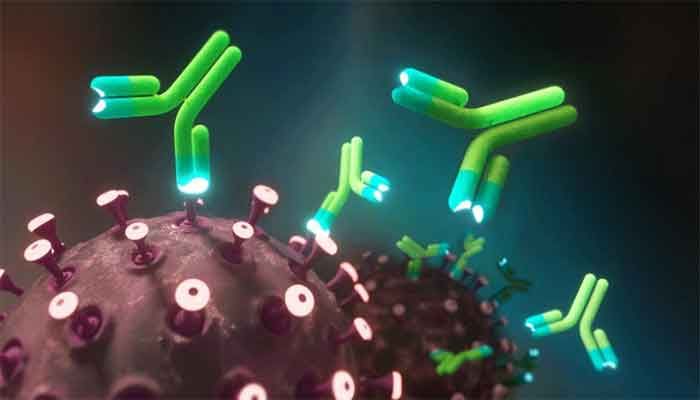
Desk Report
Publish: 26 Dec 2020, 11:07 am

After being exposed to coronavirus, in the first trial of its kind, ten people were given antibodies as a means of emergency protection.
The experimental jab is being offered within the last eight days to individuals who have been in close touch with a reported case of Covid-19, reports BBC.
If it proves effective, it could protect vulnerable people who haven't yet been, or can't be, vaccinated.
And it could help to contain outbreaks.
The trial, conducted at the University College London Hospitals (UCLH) NHS Trust, investigates whether the injection of two separate antibodies could prevent anyone who has been exposed to Covid from contracting the disease or at least from becoming very ill.
Vaccines take weeks to have maximum security, which ensures that it is too late for them to be provided until someone has the virus in their bloodstream.
But this monoclonal antibody treatment, developed by the drugs company AstraZeneca, should work to neutralise the virus immediately.
And it gives ongoing protection for up to a year.
This could mean that health care staff, hospital patients and home care residents could be treated if they were subjected to a known Covid case.
It could be offered by their GPs to people with health vulnerabilities.
And it may be used to avoid one or two cases from developing into outbreaks in settings such as student accommodation.
The team, lead by UCLH virologist Dr Catherine Houlihan, wants to recruit 1,000 volunteers.
They are targeting recruitment at areas where people are likely to have been exposed including hospitals and student accommodation.
People wanting to take part will have to show their close contact has tested positive.
The jab works by "donating" antibodies, Dr Houlihan said - "it skips out that stage of your body doing the work" to make them.
"We know that this antibody combination can neutralise the virus, so we hope to find that giving this treatment via injection can lead to immediate protection against the development of Covid-19 in people who have been exposed - when it would be too late to offer a vaccine."
She explained this technique was already used post-exposure for other viruses like rabies, and chickenpox in pregnant people.
Pre-exposure
Another study already underway at UCLH is looking at whether the same antibody therapy may be used before anyone is exposed to coronavirus to prevent them from ever contracting coronavirus.
This could be especially useful for people who have immune disorders or who are undergoing immune suppression therapy, such as chemotherapy.
Infectious diseases consultant Dr Nicky Longley, who is running the pre-exposure trial, said it was being trialled on people with conditions like cancer and HIV which "may affect the ability of their immune system to respond to a vaccine.
"We want to reassure anyone for whom a vaccine may not work that we can offer an alternative which is just as protective."
It can also be useful to protect elderly people as a stopgap before they can obtain a vaccine, Dr. Houlihan confirmed.
But she said it was not proposed as an alternative to the vaccine. And it's also likely to cost a lot more than a hundred pounds a dose.
In addition to UCLH, antibody therapy will be studied at several sites in the United States as well as in Wakefield, Manchester, Southampton and Hull.
But only the London site has begun recruiting and jabbing people.
The first results for both arms of the trial - using antibodies before and after exposure to Covid - are expected in the spring.
Subscribe Shampratik Deshkal Youtube Channel
Topic : Global Covid-19 antibodies
© 2024 Shampratik Deshkal All Rights Reserved. Design & Developed By Root Soft Bangladesh